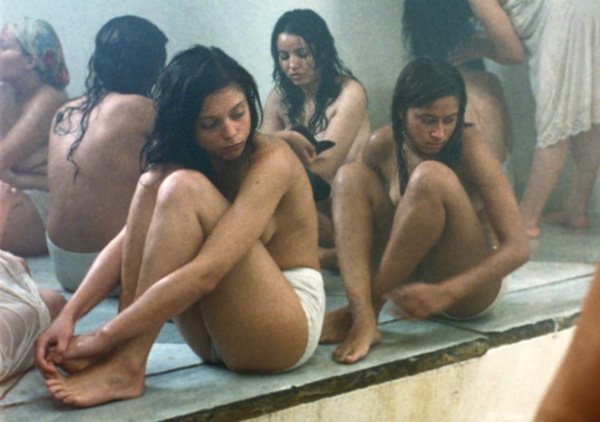|
Reviews of Recent Independent, Foreign, & Documentary Films in Theaters and DVD/Home Video

THE WEDDING SONG The Wedding Song is filmed in the language of beauty, with sensual close-ups, pouted lips, and richly colored North African interiors. Young limbs and supple breasts linger on the screen, stirring both pleasure and (during one unexpectedly graphic scene) palpable discomfort. Growing up in Tunisia at the dawn of World War II, teenagers Nour (Olympe Borval) and Myriam (Lizzie Brocheré) are tender best friends, always seeking each other’s company. Because Nour is still unveiled, and because we may not be familiar with the religious politics of the time, it takes a little while to realize that Myriam is Jewish. With inadequate subtlety, director Karin Albou (La Petite Jérusalem) develops their relationship as a vehicle for broad comments on friendship, religion, and the human heart—all too easily hijacked by hate. Though undeniably beautiful, the film often feels heavy with symbolic intention. Nour’s engagement to Khaled (Najib Oudghiri), a poor young boy whom she loves, stands in obvious contrast to Myriam’s forced engagement to a rich, older man (Simon Abkarian), whom she fiercely refuses. While Nour discovers her fiancé’s harsh, close-minded nature, Myriam grows to love her future husband, and so the plot seesaws, clumsily rocking back and forth between the pressures on the young women. Both leads give touching performances, but the trajectory of their character development pulls them in melodramatic directions. Nour’s faith-blind relationship with Myriam is suddenly tested as the Nazi occupiers flood the country with anti-Semitic rage and exploit the Arabs to target Jews more easily. Fanned by her fiancé’s Nazi sympathies, Nour easily succumbs to prejudice, suddenly viewing her lifelong neighbors as the enemies of Islam and Arab Tunisia. Under the Allies’ falling bombs, Nour’s fickle change
of heart is easy to ascribe to fear as well as to her youth and lack of
education. But we are also meant to see it as an example of the
irrational fervor of ideology and our alarming susceptibility to embrace
hatred at any stage of life. For the adult
viewer (and given the sexual content, this film would definitely be
rated R), the simplistic moralizing may seem childish, and even
condescending. On the other hand, The Wedding Song offers a
survey of a little known chapter of World War II and a sumptuous visual
feast. Yana Litovsky
|

